Cliffs' Q2 earnings hit by soft pricing, demand
Cleveland-Cliffs’ earnings tumbled in the second quarter as the company cited weak demand and pricing.
Cleveland-Cliffs’ earnings tumbled in the second quarter as the company cited weak demand and pricing.

Sheet steel buyers continue to report that mills are willing to talk price on new orders, according to our most recent survey data collected this week.

Steel mill lead times remain short according to our latest market canvass of steel service center and manufacturer buyers. Of the sheet and plate products SMU tracks, production times for all materials are nearing historical lows not seen in months or years.
There are just 40 days left until the 2024 SMU Steel Summit gets underway on Aug. 26 at the Georgia International Convention Center (GICC) in Atlanta. And I’m pleased to announce that it's official now: More than 1,000 people have registered to at attend! Another big development: The desktop version of the networking app for the event has officially launched!
SMU’s hot-rolled coil price fell to $640 per short ton (st) on average on Tuesday. That’s down $10/st from last week and marks the lowest point for HR prices since December 2022, according to our pricing archives. SMU’s HR price is now $5/ton below 2023’s low of $645/st, which occurred against the backdrop of a United Auto Workers (UAW) union strike.
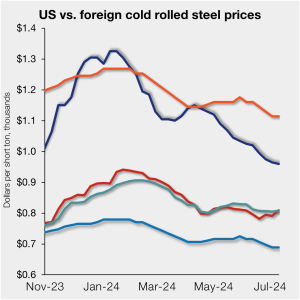
Offshore cold-rolled (CR) coil remains cheaper than domestic product. The gap continues to tighten, however, as US CR coil prices slip to a nine-month low. Domestic CR coil tags averaged $960 per short ton (st) in our check of the market on Tuesday, July 9, down $5/st from the week before. CR tags are now […]
We’ve taken some time to supply you with some handy-dandy production figures for 2024 presented in a unique way.
Flat-rolled steel prices have been largely falling since the beginning of the year. Even after a slight bump in early April when mills tried to halt the downtrend, the decrease resumed.

US sheet prices saw a similar pattern this week, customary for much of the year – new week, lower prices. Domestic tags moved lower this week, aligning with the typically slower summer period – but maybe a further indication of dwindling demand.
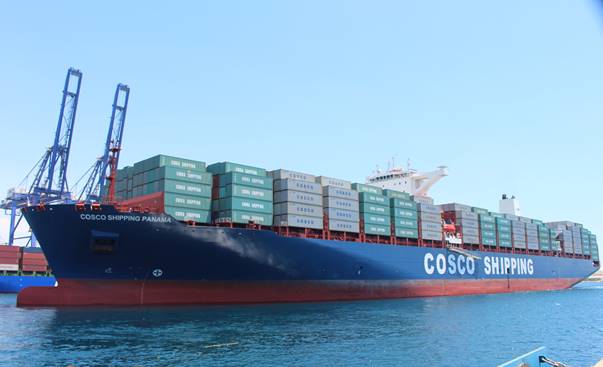
Following April’s eight-month high, May represents the second-lowest export rate of the year, only greater than January’s 771,000 st level.

Steel mill lead times remain near some of the lowest levels witnessed in months, according to our latest market canvass to steel service centers and manufacturers.

US sheet prices moved lower again this week, continuing a trend seen since early April. The slowdown aligns with the typical summer doldrums, when lax demand and shorter lead times often take center stage. The current market is also characterized by ample supply and concerns about restocking – especially with few signs of a bottom […]
Low global sheet demand continued to weigh on prices around the world this week. In the US, mills were forced to remain aggressive to secure orders during this period of demand weakness. And compounded by recent new capacity ramp-ups, has forced US hot rolled (HR) coil prices down closer to levels seen in offshore markets. […]
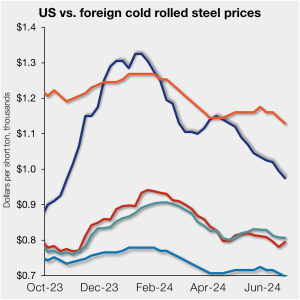
Offshore cold-rolled (CR) coil remains cheaper than domestic product pricing even as US CR coil prices slip to an eight-month low. Domestic CR coil tags stood at $975 per short ton (st) on average in our check of the market on Tuesday, June 25, down $20/st from the week before. Domestic CR prices are, on […]

Following a relatively stable first quarter, steel imports climbed in May to levels not seen in over two-years, according to preliminary Census data released earlier this week. Projected June license data suggests imports could ease from May, though still strong in comparison to levels witnessed over the past year.
Earlier this week, SMU polled steel buyers on an array of topics, ranging from market prices, demand, and inventories to imports and evolving market events.

US sheet prices continued to drift lower this week on lackluster demand, short lead times, and ample supply. SMU’s hot-rolled (HR) coil price now stands at $670 per short ton (st) on average, down $15/st from last week. Hot band is down $175/st from a recent high of $845/st in early April. It is also […]
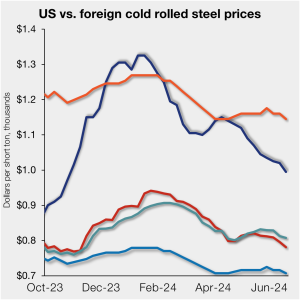
Offshore cold-rolled (CR) coil prices are cheaper than domestic product despite US CR coil prices ticking lower. Domestic CR coil tags stand at $995 per short ton (st) on average, down $25/st vs. our prior check of the market on Tuesday, June 18. (We will update prices again on Tuesday, June 25.) All told, US […]

Steel mill lead times remain short for all steel products tracked by SMU, according to our latest market survey. Service center and manufacturers continue to report short to normal lead times for sheet and plate products.

Steel buyers of hot-rolled, cold-rolled, and galvanized products found mills more willing to negotiate spot pricing this week, according to our most recent survey data. However, buyers of Galvalume and plate products said mills were less willing to talk price.

US sheet prices edged lower this week as discounting continues. Major factors remain ample supply, shorter lead times, and lower input costs. Meanwhile, demand had remained steady to soft, depending on the end market. SMU’s hot-rolled (HR) coil price now stands at $685 per short ton (st) on average, down $25/st from last week. Hot […]
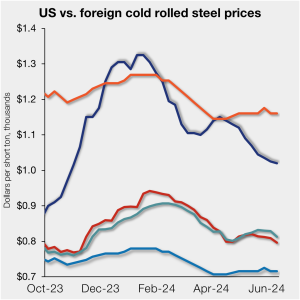
Offshore cold-rolled (CR) coil prices have changed little, but they are still notably cheaper than domestic product. That remains the case even as US CR coil prices ticked lower this week.

US sheet prices continued to tick down this week as supply seems to outweigh demand, and deep discounts are not only for large-ton buys.

Total steel exports rebounded 6% in April, rising to 842,000 short tons (st) according to the latest US Department of Commerce data.
Now that June has arrived, the official countdown until SMU’s Steel Summit 2024 – North America’s premier flat-rolled steel conference – has begun. If you haven’t already registered, don’t delay. More than 700 attendees from more than 300 companies have already registered to be in Atlanta this August. In short, it’s poised to be another […]
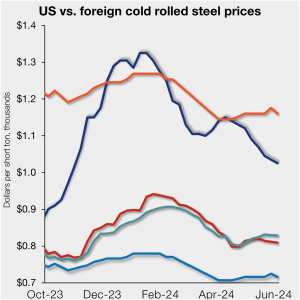
Offshore cold-rolled (CR) coil prices remain notably cheaper than domestic product. That remains the case even as US CR coil prices continue to tick lower.
It feels like the summer doldrums arrived a little earlier than usual this year. I know there had been rumors of a price hike. The prospect of a sharply lower June scrap trade probably didn't help the chances of that actually happening.

US sheet prices remained on a downward course again this week amid chatter in some corners about a potential broader slowdown in demand. SMU’s hot-rolled (HR) coil price now stands at $730 per short ton (st) on average, down $20/st from last week and down $115/st from a recent high of $845/st in early April. […]

We’re just a few months away from SMU’s Steel Summit 2024 – North America’s premier flat-rolled steel conference.
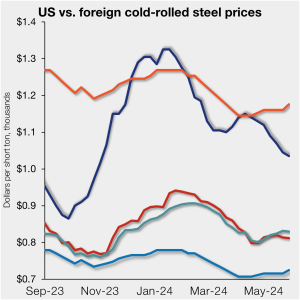
Offshore cold-rolled (CR) coil prices remain significantly cheaper than domestic product. That remains the cause even as US CR coil prices continued to tick lower. All told, US CR prices are now 17.6% more expensive than imports. While still high, that premium is down from 19.4% last week and down from 31.5% in early January.